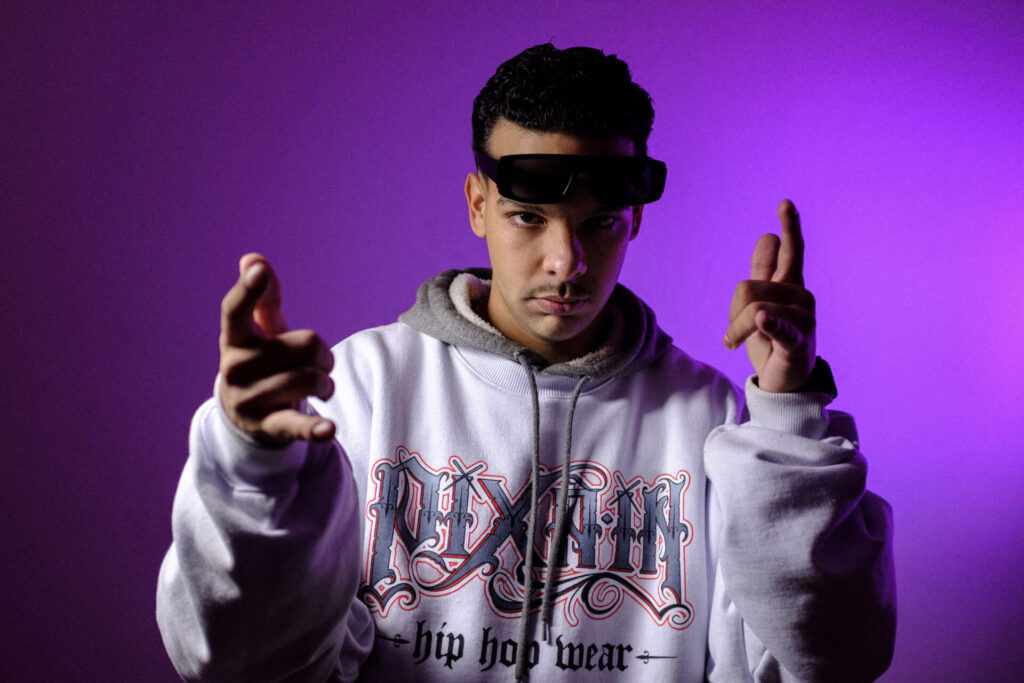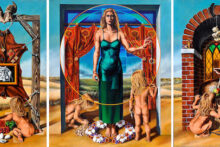Once a rare dye that denoted nobility, hip hop had its own spin on the colour purple. From graffiti crowns to Ralph Lauren Polo, repurposing and remixing symbols of wealth is a fixture of hip hop culture. In part, this can be read as adopted status symbols, but there’s more to it than that. Take Polo shirts, worn oversized and paired with streetwear. This wasn’t just bourgeois WASP cosplay, more like a mark of cultural presence in an otherwise restricted space. Hip hop adopted purple in that same way, but it has other connotations too. Purple drank, or Lean, is a cough syrup known for its distinctive hue, as well as its contradictory effects of lethargy and euphoria. Lean has influenced the sound, visuals, and subject matter of everything from chopped and screwed to psychedelic trap. Over time these Southern sounds have spread globally like a ceaseless tide of purple treacle.
In the US, purple flaunts and intoxicates. Purple is desire, decadence and delirium.
Purple also has rich symbolism in Brazil. At funerals it relates to grief, mourning, and a reverence for life now beyond this earthly plain. It’s central to the artwork of Kaique Vieira, who goes by the moniker DJ K. Pronounced “DJ Ka”, this São Paulo producer works at the very limits of baile funk, pioneer of his own sound and scene, dubbed bruxaria, which translates as ‘witchcraft’. From its origins in the favelas of Rio de Janeiro, funk has a history of interpolating sounds like Miami bass, and more recently trap. Aesthetically, we can see in the artwork a great deal of commonality between DJ K and aforementioned rap styles. There’s the brash chaos of Cash Money, the low-res horror of Three 6 Mafia, and the purrple haze of DJ Screw.
It’s evident on this new record, Radio Libertadora!. With a puff of purple smoke, we see a sneering set of teeth. The garish clown that hovers behind him looks like it should be plastered on some contraband energy drink, with a grim reaper grin that seems to take pleasure in the knowledge of sealed fates. Horrorcore is a natural ancestor. The cover has that mix of egged-on macabre and below-the-counter sketchiness, a sensibility that manifests in the music. That said, no cover could brace you for the intensity of DJ K’s sound. Preview cut ‘MEGA SUICIDIO AUDITIVO’ is a barrage of manic cackles, shimmying sirens, and hits of low end that (to steal a title from Les Rallizes Dénudés) are heavier than a death in the family. Time spent with noise, gabba, darkside hardcore, the power bass of Indian sound systems, indeed, prior waves of Brazilian funk, can all help you to some degree, but this is self-evidently a new threshold you have to adapt to.
It’s a very different beast to Nyege Nyege label mate DJ Anderson do Paraiso, the Belo Horizonte producer who toils in the same pit of menace as DJ K, but takes it in the form of gothic austerity, a sound that’s lithe and mean, a serpent coiled around a tombstone. Witchcraft pretty well sums up DJ K’s spin on funk, but these are not spells to lull you into a stupor. No, these are revolutionary hexes. That hallucinatory purple fog doesn’t obscure, it hones in and heightens.
This is a defiant working class sound primed against militarised facism. That liberatory impulse is there from the off. Over a foreboding Jigsaw melody, ‘ESTA NO AR A RADIO’ samples a 1969 speech by the Marxist-Leninist politician and writer Carlos Marighella, broadcast on a hijacked Rádio Nacional. Marighella was a founder of urban guerrilla group Ação Libertadora Nacional and author of the communist text Minimanual of the Urban Guerrilla. Assassinated in 1969, Marighella’s revolutionary agitations make him a kindred spirit with funk artists like DJ K, who face their own clashes with the police and authorities. As reported by Raphael Tsavkko Garcia in DJ Mag, funk has been and continues to be criminalised, with incidents like what occurred at Baile da D Z7 in December 2019, where party-goers were kettled then hit with tear gas and rubber bullets. “Nine people were killed,” writes Garcia, “Gustavo Cruz Xavier was the youngest to die. He was just 14. According to witnesses, the police occupied all possible exits from the street, making it difficult to escape and leading to the panic.”
The album is inseparable from its sociopolitical context. MCs are incendiary, with frothing fire vocals distinct from that other São Paulo sound, ostentação, a far more aspirational form of funk. On ‘BEAT SUGA ALMA’, the kid MC sounds every bit as tough as the revved engine synths he’s surrounded by, while the call to prayer on ‘SUA FILHA QUER OS D’ marks the favela as righteous holy ground, as well as a site of insurrectionary potential. There’s a real focus on repetitious insistence, the sonic texture of every syllable. Unlike hip hop where the beat is often the bedding for an MC to flex, here they are enmeshed.
You might wonder if this music goes beyond the point of dancefloor functionality, closer in practice to extreme noise. But perhaps it’s our notions of functionality that need to be widened. Speaking on the No Tags podcast, GG Albuquerque, a journalist and researcher from Recife who accompanied DJ K on tour, spoke of how pushers of the bruxaria sound “see this as something danceable and enjoyable.” He points to the drug lolo as partial rationale for this love of shrill high end. In terms of effect, the drug “gives you this sense of buzzing in your ear, you get more sensitivity to the high pitched sounds.” This creates a feedback loop of exponential excess, taking drugs to make music to take drugs to, as the saying goes – though evidently, the musical want of one drug is not necessarily the same as another.
Even for the uninitiated, Radio Libertadora! is far from pure punishment. ‘ALI PERTO DA IMIGRANTES’ is a certified banger, with an all but steady fairground beat, a back and forth “ah—oh” seesaw, uncharacteristically melodic vocals from MC DUCASA, plus a reappearance of that toybox melody which opened the record. The horns on ‘SOBREVIVE CONTRA O ESTADO’ sound like sunlight stampeding over the horizon, a rush of epic daybreak. Meanwhile, the synths that cut up ‘SEQUENCIA DE BEAT ENTORTA NOIA’ have a distinct industrial techno oomph to them, and seem to encourage even higher levels of abandon than in their usual leathery setting, proof that everything hits harder in a K context.
But it’s the beat switches that are most confounding. You might get a build-up, an opportunity to prep, but these sites of anticipation often give no indication as to what might lurk on the other side, how loud it will be, or what will take on the role of what. Writing about Public Image Ltd.’s ‘Memories’, Lester Bangs describes a point in the track where a switch is flicked, a weedy sound now urgent with buffed up fidelity. “The whole sound shifts into a new and hotter realm”, he writes, “It’s something I have never in my life heard anyone do in the middle of a track.” Such upheavals are the baseline of a DJ K tune.
Here’s another way of putting it. In a previous flat of mine, our electricity was on a pay-as-you-go meter. Every time we ran out, an ear-splitting alarm would be triggered that could be heard from down the street. One time I was alone in the flat, having a shower in our windowless bathroom. The electricity went. In an instant the lights cut out and the boiler turned off. I was left standing there naked in the pitch black, ice cold water now pouring over me, alarm blaring. This is what a DJ K beat switch feels like. Full body panic mode. Yet unlike that situation, the demands of this record become more and more addictive.
Like many forms of dance music, funk is primed for the live DJ mix, where a performer has to splice up the tracks in the moment and feed off the energy of the crowd. You have to wonder if something is lost migrating over to the album – or even mixtape – format. That said, artists like d.silvestre and DJ K might well have cracked that code. I’ve not yet had the chance to hear this music in its natural setting, but perhaps more than any funk full length, Radio Libertadora! gives a real indication of what that might be like.
So send in the clowns. Bring on the purple revolution.
DJ K is no longer producing. He’s making witchcraft.



